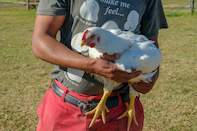
Use your Ears
Listen to the birds. Continuous chirping is an indication that something is wrong. There may be a predator, such as a hawk or snake, disturbing the peace, in which case the birds will also be scurrying around for shelter.
Also listen for sneezing, snickering, wheezing, coughing, gurgling or laboured breathing, which may be due to upper respiratory tract problems, toxic ammonia levels or a reaction to Newcastle disease vaccine.
Use your Nose
If you are uncomfortable sitting in the poultry house because of foul air, the birds will also be. Crouch down to get on the same level as the birds, take a deep breath and smell the air.
air should be fresh, yet there should not be any draughts reaching the birds. Excessive dust will irritate the respiratory system of the birds and contain Escherichia coli bacteria, which may lead to secondary infections.
sharp ammonia smell indicates a problem with poor ventilation, litter or drinker management. Besides being harsh on the nose, it will also cause skin or eye irritations.
The problem is that ammonia would have already caused damage to the upper respiratory system of birds by the time you can smell it. Chicks are generally more sensitive to ammonia than older birds.
Use your Mouth
Smell and taste the feed and water. The drinkers and water should be clean enough for you to drink from it. The same applies to the feed. The water should not have high levels of chlorine as this would have a negative impact on water in-take and may lead to kidney problems.
Feed that taste musty could contain mycotoxins, which can lead to diseases and cause poor weight gain. Excessive salt may cause wet droppings, which in turn may have a negative impact on litter management. Remember that feed loses nutritional value as it becomes old and stale.
Use your Hands
Feel and look at the litter. If the litter is too wet, hard or caked, there is a litter management problem that can lead to diseases or injuries. Also take the birds into your hands and evaluate the condition of the birds by feeling the muscles around the breastbone.
In a healthy chicken, the muscle will cover the breastbone, but you will feel the breastbone clearly with little muscle covering on each side when birds are sick, not eating or not receiving enough food.
By Glenneis Kriel